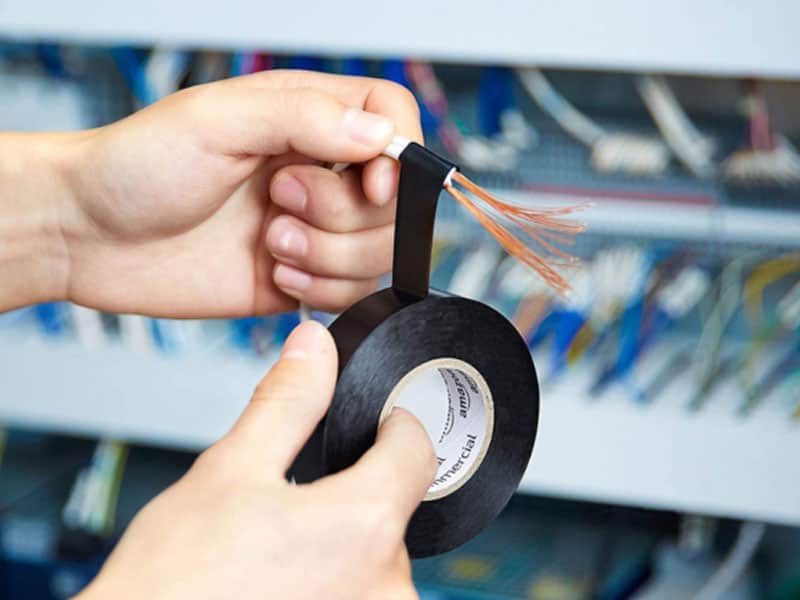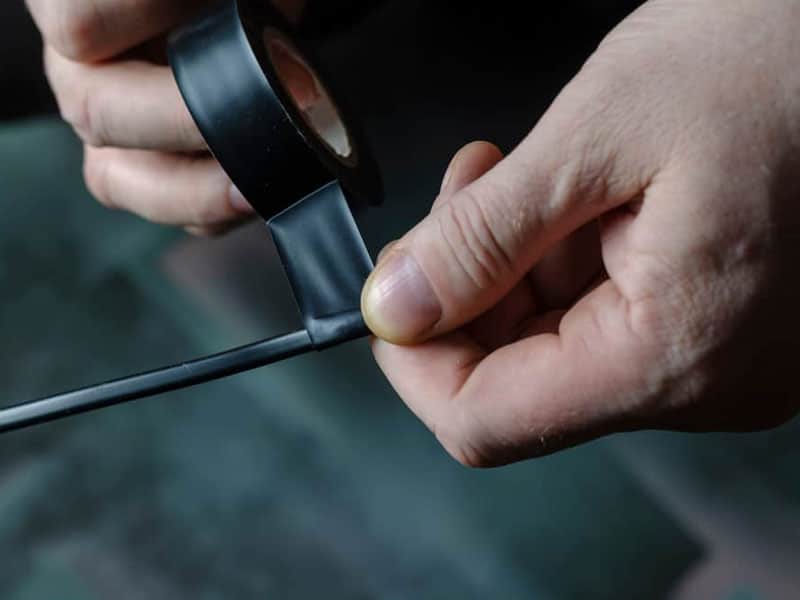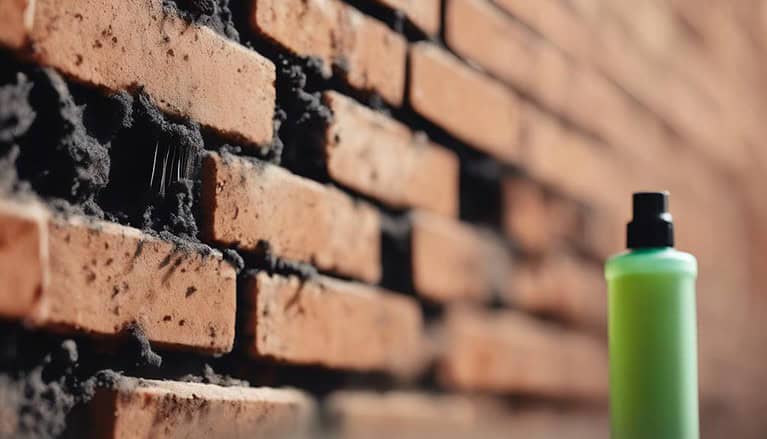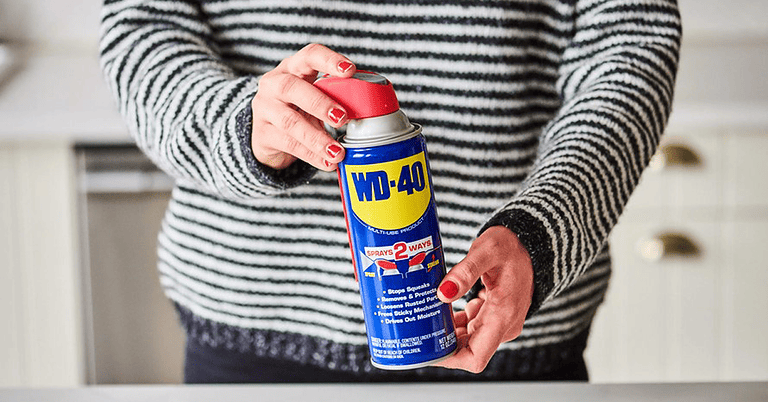Can I Use Duct Tape Instead Of Electrical Tape
Are you feeling like MacGyver and thinking of using duct tape instead of electrical tape for your wiring needs? Well, hold on to your mullet because we’re about to uncover the truth. While duct tape may seem like a versatile solution for all your adhesive needs, it’s a big no-no when it comes to electrical work. Electrical tape is designed to insulate and protect wires, while duct tape is meant for sealing air ducts. The differences are as clear as night vision goggles in a dimly lit room.
Electrical tape is made from stretchy vinyl or PVC material that provides superior insulation against current flow, whereas duct tape is made of cloth with polyethylene coating and fibers. Duct tape lacks the heat resistance, adhesion properties, and moisture resistance required for safe electrical connections. So unless you want sparks flying like fireworks on the 4th of July, stick with electrical tape and leave the duct-tape heroics to Hollywood.

Understanding the Differences Between Duct Tape and Electrical Tape
If you’re wondering whether you can use duct tape instead of electrical tape, it’s important to understand the differences between them. Electrical tape is specifically designed for insulating wires and protecting against electrical currents. Duct tape, however, is primarily used for sealing air ducts and is not electrically rated or suitable for electrical work.
While both tapes have adhesive properties, electrical tape has better insulation properties and is more durable in high-temperature environments. (Learn How To Use A Flaring Tool)
How Electrical Tape is Designed
When it comes to the design of electrical tape, it’s important to understand how it differs from duct tape. Here are four key points about how electrical tape is designed:
- Electrical tape is made of stretchy vinyl or PVC material for better insulation against current.
- It has high adhesion and resistance to corrosion, making it suitable for electrical work.
- Electrical tape is flame retardant and can withstand up to 600 volts.
- It provides insulation and protection against live currents.
Now let’s move on to the functions of duct tape.
Functions of Duct Tape
Get ready to stick it all together with the versatile superhero of tape: duct tape, the ultimate problem-solving tool in your toolbox. Using duct tape instead of electrical tape isn’t recommended when it comes to electrical work. While duct tape can be used as a temporary solution for insulating naked wires in emergencies, it lacks the necessary electrical properties and safety standards required for long-lasting and secure connections.
Now let’s compare the adhesive properties of duct tape and electrical tape.
Adhesive Properties: Duct Tape Vs Electrical Tape
Discover the key differences in adhesive properties between duct tape and electrical tape, ensuring you choose the right tape for your specific needs.
- Duct tape has a stronger adhesive than electrical tape.
- Duct tape is not electrically rated and may not work with all voltage systems.
- Electrical tape is specifically designed to adhere to wiring and cables.
Now, let’s explore the insulating properties of electrical tape compared to duct tape.
Insulating Properties: Electrical Tape Vs Duct Tape
Experience the superior insulating properties of electrical tape compared to duct tape. Electrical tape is specifically designed for electrical applications, providing reliable insulation and protection against live currents. Its stretchy vinyl or PVC material ensures a tight seal around wires, preventing any potential contact with conductive surfaces. On the other hand, duct tape lacks the necessary electrical insulating properties and shouldn’t be used as a substitute for electrical tape. (Learn How To Cut Countertop Laminate)
Now let’s explore the different types of electrical tape versus duct tape…

Types of Electrical Tape Vs Duct Tape
Step into the world of electrical tape and duct tape, where a colorful array of options awaits to shield and insulate your wires. Electrical tape is made of rubber, vinyl, mastic, and varnished cambric. It is specifically designed for electrical work. On the other hand, duct tape is primarily used for sealing air ducts. It is not a suitable substitute for electrical tape due to its lack of electrical insulation properties. Now let’s explore whether duct tape can substitute for electrical tape.
Can Duct Tape Substitute For Electrical Tape?
When it comes to electrical work, it’s important to understand why duct tape shouldn’t replace electrical tape. Duct tape may seem convenient, but it lacks the necessary properties for safe and effective insulation of wires. Instead, wire nuts and heat shrink tubing should be used alongside electrical tape to ensure secure connections and reliable insulation. While masking tape can be used in certain situations, Scotch tape isn’t recommended as a substitute due to its limited insulating capabilities.
Generally, standard electrical tape is preferable for protecting against dust, moisture, UV radiation, and solvents while providing proper insulation for wires.
Why Duct Tape Shouldn’t Replace Electrical Tape
Although duct tape may seem like a viable alternative, it is important to understand why it shouldn’t replace electrical tape. Duct tape is durable and versatile but lacks the necessary properties for electrical work. It is not electrically rated and may not work with all voltage systems. Additionally, duct tape loses its adhesive properties when in contact with water and carries a risk of fire and electrocution.
Roles of Wire Nuts and Heat Shrinks
Wire nuts and heat shrinks are important in securing and insulating electrical connections, ensuring safety and reliability. Unlike duct tape, wire nuts are specifically designed for electrical work. They provide a secure connection by twisting together multiple wires and have built-in insulation to prevent electrical shorts.
Heat shrink tubing is another alternative to electrical tape, providing durability and reliability by shrinking around the connection when heated. Understanding these alternatives highlights the dangers of using duct tape instead of electrical tape.
Understanding the Dangers of Using Duct Tape Instead of Electrical Tape
To truly ensure the safety of your electrical connections, it’s crucial to understand the potential dangers of relying on duct tape instead of electrical tape. While duct tape may seem like a convenient substitute, it lacks the necessary properties to provide proper insulation and protection against live currents. Using duct tape instead of electrical tape can result in heat buildup, adhesive melting, and even fire hazards. (Read No Slam Door Hinge)
Maybe Use Masking Tape, But Why Not Scotch Tape?
While masking tape may be a temporary option, it’s important to note that Scotch tape shouldn’t be used as a substitute for electrical tape. Masking tape lacks the insulation properties and adhesion strength required for electrical applications. It isn’t designed to withstand high temperatures or protect against moisture and other environmental factors.
Therefore, using electrical tape instead of duct tape or masking tape when working with electrical wires and connections is always recommended. Now let’s discuss why standard electrical tape is preferable in these situations.
Why Standard Electrical Tape is Preferable
When insulating and protecting your electrical wires, there’s no better choice than standard electrical tape. Unlike duct tape, standard electrical tape is designed for electrical work and offers superior insulation and protection against current. Here are three reasons why standard electrical tape is preferable as an alternative to duct tape:
- Electrical Safety: Standard electrical tape is electrically rated and can handle the voltage requirements of most systems.
- Heat Resistance: Electrical tape is made of materials that can withstand high temperatures, providing added safety in hot environments.
- Durability: Standard electrical tape is durable and long-lasting, ensuring a reliable and secure connection for your wires.
When Should You Use Duct Tape Instead of Electrical Tape?
When it’s safe to use duct tape instead of electrical tape, consider using it for non-electrical applications such as sealing air ducts or labeling purposes. However, when insulating electrical wires and providing protection against high voltages, duct tape is not a suitable substitute for electrical tape. Using duct tape over electrical tape has pros and cons. While it may provide temporary holding power and durability, it lacks the necessary insulation properties and can pose risks of heat buildup and fire.
Choosing the ideal type of tape for insulating electrical wires is important, such as electrical tape specifically designed for this purpose. Additionally, unlike electrical tape, which offers some level of water resistance, duct tape is not waterproof like electrical tape.
When it’s Safe to Use Duct Tape
Although duct tape is a versatile and durable adhesive, it shouldn’t be used as a substitute for electrical tape when insulating electrical wires. This is because duct tape lacks electrical insulation properties and doesn’t provide the necessary level of insulation to protect against live currents. Therefore, it’s unsafe for use in electrical work. It is recommended to use proper electrical tape specifically designed for insulating wires. (Learn How To Connect Two Hoses Together)
Now let’s explore when it’s unsafe to use duct tape.
When it’s Unsafe to Use Duct Tape
To ensure the safety of your electrical connections, it’s important to understand the limitations of certain adhesive materials. There are some situations where it’s unsafe when it comes to using duct tape as a substitute for electrical tape. Here are four reasons why using duct tape instead of electrical tape can be risky:
- Duct tape doesn’t provide insulation or protection against live currents.
- Duct tape isn’t rated for electrical systems and may not work properly with voltage systems.
- Duct tape loses its adhesive properties when in contact with water, increasing the risk of loose connections or exposed wires.
- Duct tape isn’t designed to withstand high temperatures like electrical tape, which could lead to adhesive melting and potential fire hazards.
Transition: Now that you understand why using duct tape instead of electrical tape can be unsafe, let’s explore the pros and cons of using duct tape over electrical tape in certain situations.
Using Duct Tape Over Electrical Tape: Pros and Cons
Using duct tape as a substitute for electrical tape can have advantages and disadvantages in certain situations. Duct tape is durable and versatile, making it suitable for temporary repairs or emergencies. However, it’s not electrically rated and may not work with all voltage systems. Additionally, duct tape loses its adhesive properties when in contact with water and carries a risk of fire and electrocution. Therefore, while duct tape can sometimes be used, it isn’t the ideal type for insulating electrical wires.
The Ideal Type of Tape for Insulating Electrical Wires
The optimal choice for insulating electrical wires is like finding the perfect puzzle piece that ensures a secure and reliable connection. When insulating electrical wires, duct tape is not the ideal option. Electrical tape is designed to provide better insulation and protection against electrical current. Its stretchy vinyl or PVC material allows for better performance in adverse conditions.
Now let’s explore if duct tape is waterproof like electrical tape.
Is Duct Tape Waterproof Like Electrical Tape?
Unfortunately, duct tape doesn’t provide the same waterproof protection as electrical tape. Duct tape is durable and versatile but isn’t specifically designed to be waterproof like electrical tape. On the other hand, electrical tape has a certain level of weather and water resistance. So, if you need waterproof protection for your electrical wires or cables, it’s recommended to use electrical tape instead.
Now let’s explore alternatives to electrical tape.
Exploring Alternatives to Electrical Tape
Proper insulation is critical for safety and preventing electrical hazards when it comes to electrical work. Understanding the role of electrical components and tapes is important in ensuring a secure and reliable connection. While PVC or vinyl tapes are commonly used for insulation, it’s essential to know when they should be considered as alternatives to electrical tape. Also, homemade substitutes for electrical tape should never be used due to potential risks, and using duct tape instead can harm electrical insulation.

Why Electrical Insulation is Critical
Insulating electrical connections properly is crucial to ensure safety and prevent potential disasters. Using duct tape instead of electrical tape can compromise the integrity of the insulation, leading to a higher risk of electrical shock or fire. Electrical tape is designed to provide reliable insulation against electrical current, while duct tape lacks the necessary properties for safe electrical work. When considering alternatives, it’s important to prioritize materials like PVC or vinyl tapes that are specifically made for electrical insulation.
When to Consider PVC or Vinyl Tapes
For optimal electrical insulation, it’s essential to consider PVC or vinyl tapes as they’re specifically engineered to provide reliable protection against electrical current. On the other hand, duct tape isn’t designed for use as an electrical tape substitute.
PVC and vinyl tapes have adhesive properties that adhere well to electrical wires, ensuring a secure and insulated connection. Understanding the role of electrical components and tapes will further enhance your knowledge of proper insulation techniques.
Understanding the Role of Electrical Components and Tapes
Explore the fascinating world of electrical components and tapes to understand better how they play a crucial role in ensuring safe and reliable connections. Here are four key points to consider:
- Electrical tape: Specifically designed for electrical applications, it provides insulation, protection against moisture and UV radiation, and helps secure connections.
- Duct tape: While durable and versatile, it isn’t suitable for electrical work as it lacks proper insulation properties and can pose risks such as heat buildup or fire.
- Electrical components: Wire nuts, heat shrink tubing, and connectors are safer alternatives that provide secure connections while maintaining proper insulation.
- Importance of using the right tape: Using the appropriate electrical tape ensures safety by preventing hazards related to current leakage or short circuits.
Now let’s explore if there are any options for making homemade substitutes for electrical tape.
Can Electrical Tape Substitute Be Home-made?
Crafting your own makeshift insulation for electrical purposes is like trying to build a sandcastle with spaghetti – it may seem creative, but it won’t hold up under pressure. While duct tape can be a versatile tool, it shouldn’t be used as a substitute for electrical tape. Duct tape lacks the necessary electrical insulation properties and may not protect against live currents adequately.
Now let’s explore the effects of using duct tape on electrical insulation.
The Effects of Using Duct Tape on Electrical Insulation
Ladies and gentlemen, let me tell you about the impact of relying on duct tape for your electrical insulation needs. Using duct tape as a substitute for electrical tape can harm the insulation of your electrical connections. Duct tape lacks the necessary properties to provide proper electrical insulation, such as adhesion and resistance to heat. Understanding why you should never use duct tape for electrical insulation is important.
Why You Should Never Use Duct Tape For Electrical Insulation
Using duct tape instead of electrical tape for electrical insulation poses significant risks. Duct tape is not designed or rated for electrical work and lacks the necessary properties to ensure safety and reliability. It cannot replace electrical tape in terms of insulating capabilities, adhesion strength, and resistance to heat and moisture. Understanding why electrical tape doesn’t need a substitute emphasizes the importance of using the right tape for specific applications in electrical work.
In practical cases where the wrong type of tape is used, disasters such as overheating, adhesive melting, and potential fire hazards can occur.
The Risks of Using Duct Tape Instead of Electrical Tape
Beware of the potential dangers when substituting duct tape for electrical tape, as it’s like relying on a flimsy umbrella in a thunderstorm. Here are four risks to consider:
- Electrical Hazards: Duct tape is not designed to handle high voltages and can lead to electrical shock or fire.
- Adhesive Failure: Duct tape loses its adhesive properties when exposed to moisture, compromising the integrity of the insulation.
- Heat Buildup: Duct tape lacks heat resistance, increasing the risk of adhesive melting and potential fire hazards.
- Code Compliance Issues: Using duct tape instead of electrical tape may not meet safety standards and could result in failed inspections.
Using duct tape instead of electrical tape puts you at serious risk. Transitioning into the subsequent section about why duct tape can’t replace electrical tape, let’s explore the limitations further.

Why Duct Tape Can’t Replace Electrical Tape
Using duct tape instead of electrical tape may seem like a convenient solution, but it’s important to understand why it can’t replace it. There are significant differences between these two types of tapes. While duct tape is durable and versatile, it lacks the necessary properties for electrical work. Electrical tape is designed to insulate wires and protect against high voltages, making it a safer and more reliable choice.
Now let’s understand why electrical tape doesn’t need a substitute.
Understanding Why Electrical Tape Doesn’t Need a Substitute
Electrical tape is an essential tool for insulating and protecting wires. Its unique properties make it irreplaceable. Unlike duct tape, electrical tape is specifically designed to handle electrical work demands. It provides reliable insulation, protection against moisture and UV radiation and can withstand high temperatures.
On the other hand, duct tape lacks these crucial characteristics and should never be used as a substitute for electrical tape. Understanding the importance of using the right tape in electrical work is paramount for ensuring safety and proper functionality.
The Importance of Using the Right Tape In Electrical Work
Ensuring the safety of your electrical projects requires selecting the proper tape that guarantees reliable insulation and protection. When it comes to electrical work, using duct tape instead of electrical tape is not recommended. Here’s why:
- Duct tape is not designed for electrical applications and may not provide adequate insulation or protection.
- Electrical tape is specifically manufactured to withstand high temperatures and voltages.
- Using the wrong type of tape can lead to disasters in practical cases.
Now let’s explore some practical cases where using the wrong types of tapes have led to disastrous consequences.
Practical Cases: Disasters from Using Wrong Tape Types
Mistakenly selecting an inappropriate tape for electrical work can result in disastrous outcomes that compromise safety and effectiveness. When it comes to electrical work, using duct tape instead of electrical tape is never recommended. Duct tape is not designed or rated for electrical applications. It lacks the necessary insulation and does not protect against live currents.
Always use the appropriate electrical tape for your electrical needs to ensure proper insulation and safety.







